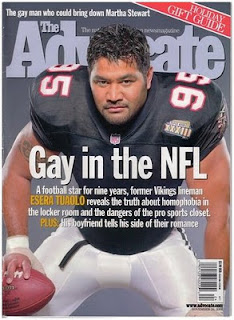 |
| Kopay’s coming out dropped a bomb on the NFL, and his autobiography The David Kopay Story topped the New York Times bestseller list for weeks in 1977 |
There are only a handful of athletes who are bigger than their sports, legends like Rocket Richard, Jackie Robinson, Billie Jean King, Muhammad Ali and, for my money, former NFL running back David Kopay. To paraphrase famed American journalist Richard Harding Davis, many athletes can make plays, but few players make history.
And make no mistake, David Kopay made sports history as the first NFLer to come out back in 1975 during what can only be called pro sports’ Jurassic era.
Kopay’s coming out dropped a bomb on the NFL, and his autobiography The David Kopay Story topped the New York Times bestseller list for weeks in 1977. Kopay then championed gay civil rights when he spoke to Congress in 1977, the American Bar Association in 1979, and the American Association of Pediatrics in 1980.
 |
| Kopay is also Tuaolo's hero |
Says an awed Kopay, "That’s still unbelievable to me."
Kopay’s autobiography also literally saved the life of former Green Bay Packer and Atlanta Falcon Esera Tuaolo, who, when he came out on ESPN’s Real Sports in 2002, became just the third player in league history to do so (after Kopay and Roy Simmons who, when I interviewed him I also found to be very likeable).
"When David and I met for the first time [afterwards]," Tuaolo told me after the Super Bowl a few years ago, "I bawled like a baby. It was like, ‘You saved my life,’ and for him it was, ‘You are my confirmation.’"
Kopay played football at the University of Washington before playing in the NFL for 10 years with the San Francisco 49ers, Detroit Lions, Washington Redskins, New Orleans Saints and Green Bay Packers. He never made more than $29,000 a season during his NFL career and played without signing bonuses. Before being signed to the NFL, though, Kopay was offered a position with the CFL’s Montreal Alouettes.
Says Kopay, "The CFL is a different and exciting game and gives athletes like Warren Moon and Doug Flutie a chance to play before going on to play in the NFL."
During his years in the NFL, Kopay knew there were other gay players, but he suspected few. Roy Simmons estimated in 2006 that there are roughly "one or two" gay players per team in the NFL. Kopay says, "I think there are players who could handle coming out today."
It’s true NFL teams – particularly the 49ers – have reached out, offering gay employees equal benefits and the like.
 |
| Kopay, when people still read magazines |
"He was a man of his time and finally when he was about to retire [in 2006] he was very supportive," Kopay says. "There’s more understanding [in the locker room today]. I think it’s gonna change really quickly from now on."
When it comes to testosterone in the locker room, Kopay pointedly says, "No gay player would dare say who’s got great asses – it was all the straight players! It’s always the straight players and they notice everything!"
Now 69, Kopay says, "I’ve had a difficult time the last few years with my body parts breaking down. I’ve had replacement hip surgery, surgery on my shoulders and rotary cuff. The doctor says it’s all related to my football days, but I’ve been able to rehabilitate all my injuries so that today I’m pain-free for the first time in years."
Kopay - whose L.A. linoleum business small-office wall is covered with photos and award plaques from his football days - in 2008 donated $1 million to establish the David Kopay Endowment Fund at the University of Washington, to support the Q Center which provides professional support, advocacy and mentoring for students, faculty and staff with Lesbian, Gay, Bisexual, or Transgender concerns.
"The greatest gift we can give one another is the vision and beauty of life," Kopay said in a written statement. "I continually hear from people all over the world that my act of coming out, especially when I did in 1975, has empowered them in their search for self and to see their vision. Hopefully, my million-dollar-pledge will influence others to support the University and the Q Center continue to help others to do just that."
Kopay – a 2006 Gay Games ambassador horrified over the acrimonious split in the gay-sports movement and the $5.3 million the inaugural Montreal World Outgames lost that same year ("I don't want to hear about it," Kopay told me, but you can read my no-holds-barred take on the entire fiasco by clicking here) – never signed with the Montreal Alouettes. But he has visited Montreal five times over the years.
One winter he was in Montreal with his good friend, American author Armistead Maupin who once told me, "One of the drawbacks of fame is there no longer is such a thing as anonymous sex."
Kopay and Maupin got caught in the middle of a classic Montreal blizzard. So they went to one of the city's world-renowned male strip joints where the boys take it all off and love exposing their hard-ons.
Kopay laughs. "We were like, ‘Can you believe this!’ I really enjoyed it. The way it’s done in Montreal, it’s not sleazy at all. The kids are enjoying themselves. And God knows they’re deserving of being worshipped!"
No comments:
Post a Comment